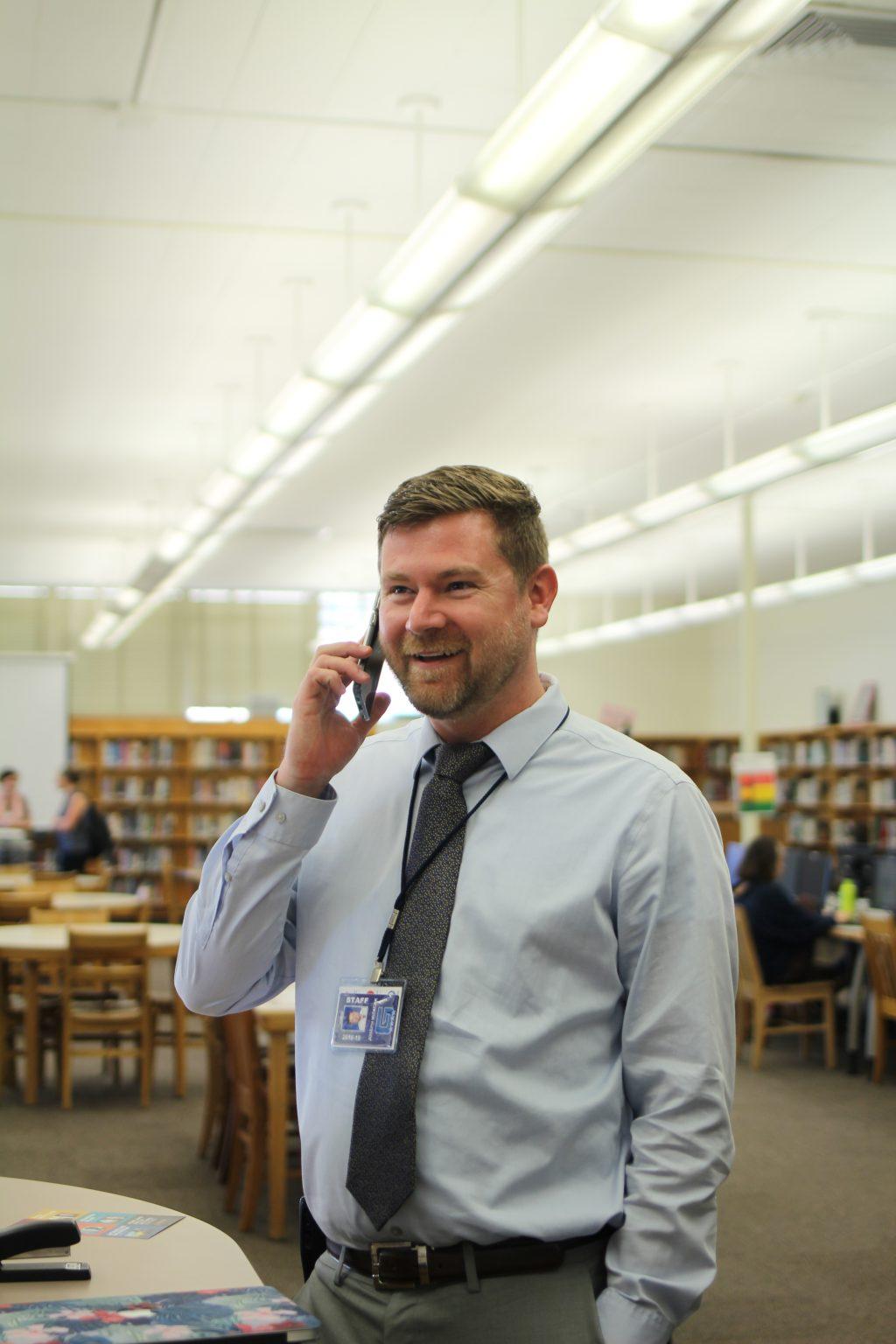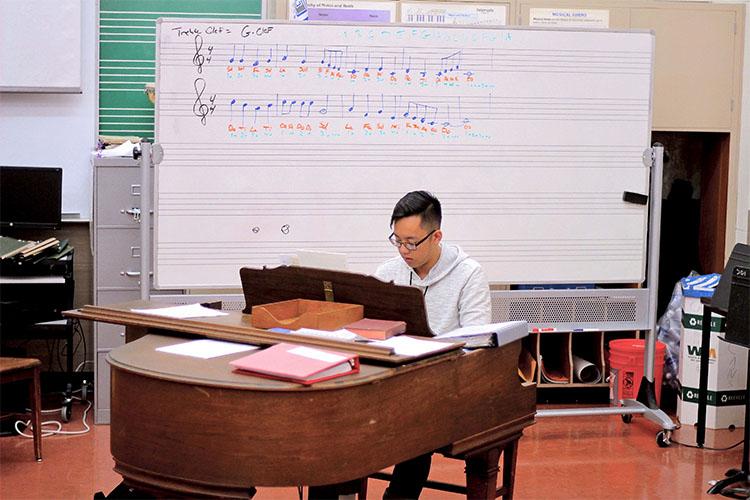
It is a sunny May morning in Limpio, Paraguay and Joseph Mitacek and his students from the embassy school are hard at work constructing a home. Mitacek is determined to finish before sunset, as there are no lights in this neighborhood due to the costliness of electricity.
Once a year, Mitacek and some of his students would travel from Asunción, Paraguay to neighborhoods recently hit by floods, health crises or other challenges. Mitacek, then the principal of the American School of Asunción (ASA) — Paraguay’s embassy school — often accompanied his students on service learning trips.
Mitacek and his students stayed for a weekend in a school nearby, but spent most of their time at the site building the simple wooden homes. His students, who were mainly international students or of wealthy Paraguayan families, had little experience with the world outside of their bubble. He had hoped this experience would allow his students to gain understandings of the poorer neighboring communities. “I really enjoyed putting those students in touch with their surroundings,” says Mitacek.
Later that night, Mitacek and his students dispersed into the yard where an open fire pit awaited. Students sat in the unfinished window frames as others helped the family for whom they were building the house cook the evening meal over the fire.
Once everything was prepared, they gathered together. Mitacek and the students ate the chicken recently killed by the family, listening as they learned of the challenges the family faced in their day-to-day life in that neighborhood in the city of Limpio.
The community surrounding them is one of extreme poverty. Without sewers or garbage pickup, everything goes into the street.
From his work in the Chicago Public School system to ASA in Paraguay, Grant’s newest vice principal has taught around the globe. Growing up in a middle-class suburb of Chicago, Mitacek never had to worry about socioeconomic struggles. But through a study abroad program in college, Mitacek was exposed to the world outside his small community for the first time.

These experiences, along with his proficiency in Spanish, led Mitacek to teaching at a primarily Latino school in inner-city Chicago and in Paraguay, where his outlook on others’ ways of life and his ability to sympathize grew. “My views drastically changed working in a community where people are different from myself,” says Mitacek. “When everyone around you is just like you, you really have a hard time envisioning what it’s like for other groups.”
Born in Batavia, a suburb outside of Chicago, Mitacek began life in what he describes as a “homogeneous town,” with neighbors of the same culture. His community was small and his experiences with other cultures and socioeconomic levels were scarce. “I had always been in a school population or a community population where white people were majority, and because of that I had never really learned about other cultures other than my own,” says Mitacek.
Mitacek studied Spanish in high school and college. While he had motivation to learn the language, studying abroad in college ultimately solidified his fascination with Spanish. At Illinois State University, he spent summer semesters in both Peru and Mexico. “I think those are experiences which made me realize, oh, there’s a whole other world out there,” says Mitacek.
Mitacek had envisioned becoming a lawyer, but after starting work at Carver Military Academy, he fell in love with education. “I think it was just something I was enjoying so much that I could do it for the rest of my life,” says Mitacek.
But teaching in the Chicago Public Schools came with a learning curve. During his first day at Carver, he noticed a student whose leg was bandaged. When Mitacek asked about it, the student replied that he had been shot.
Mitacek was shocked, having never met anyone who had been shot. “It was a big contrast, but that is a reality for many, many people,” says Mitacek.
For Mitacek, understanding and learning about those experiences helped him to connect and relate to his students.
During his second year at Carver, he signed up to work for the Marilyn G. Rabb Foundation in their efforts to train underprivileged youth for the Chicago Marathon. A runner himself, Mitacek spent every Saturday for five months training students from Carver and other area high schools by the Chicago lakefront.
Part of the program’s goal was to provide its students with nutrition and health education as many of its participants were coming from food deserts, areas where fresh food isn’t easily accessible. “Until I encountered that, I didn’t realize how much of a challenge health is for a lot of people, all over the country,” says Mitacek. “For me, it’s just you walk out your door and you can go for a run. Can you really do that if your neighborhood is infested with violence? Can you really do that if you don’t have access to quality food?”
The experience gave him insight into barriers that many face, things which he might take for granted. “I think it’s important to realize there is a world beyond your bubble. And if you don’t encounter others that are different from you, you’re not going to be considerate,” he says.
Seeing students progress throughout the year, in and out of the classroom, fulfilled Mitacek. Sylvie Holt, a friend and former colleague of Mitacek’s, met him during his first year at Carver. “He’s a gifted teacher. Even as a first-year teacher he made a connection with the children,” says Holt.
While teaching at Carver, Mitacek was able to utilize the Spanish skills he learned in high school. “About half of the population was Mexican-American and a lot of the students’ parents didn’t speak English. So I was doing a lot of the translating myself,” he says.
Mitacek says that although he knew he wasn’t 100 percent fluent, he wanted to continue to learn about the language.
When he saw an opening for a job in Asunción, Paraguay, he jumped at the opportunity. “I feel like a lot of educators don’t even know, ‘Oh I can do some job out of the country.’ So it was just a sense of, ‘I’m still young. I’m not tied down to anything yet, if I’m gonna do it I need to do it now,”’ says Mitacek.

In July 2015, Mitacek moved from Chicago to Paraguay. Mitacek pushed himself to interact with local citizens to practice Spanish and immerse himself in this new culture.
At work, the situation was a complete change of pace from Carver because the student body was much wealthier. Because of this, many of the students had little exposure to the poverty-ridden areas of Paraguay; as an administrator, Mitacek made sure to involve himself in the service learning program.
He especially enjoyed a program through TECHO — a nonprofit aimed at fighting poverty in Latin America — where he and the students spent the weekend constructing homes for families in need. They traveled to the city of Limpio where they split into groups of 10, each assigned to building a house. But one of the most memorable parts for Mitacek was the time he was able to spend with the local families. “Sitting down and having (the families) prepare lunch and dinner for us was really something, and just kind of hearing what their day-to-day life was like, maybe living off a dollar or two a day,” says Mitacek. “I think that was something very striking, just to communicate and work with people when they’re really living in extreme poverty,”
But after working at ASA for three years, Mitacek decided he needed another change. He received job offers in Bolivia and Guatemala, but both would have required him to move almost immediately, and he wanted a bit of a break. He returned to Chicago in June but didn’t intend to stay there. Some of his colleagues at the school in Paraguay had just recently come from Portland and spoke highly of it, so he applied for a job at Grant. “I was wanting to go to someplace that was still an adventure, but not maybe the other side of the world,” says Mitacek.
Now at Grant, Mitacek has brought his diverse teaching experiences with him and wants to help the students he works with find the same awareness he gained in his years teaching in Chicago and abroad.
Going forward, Mitacek is interested in incorporating service-learning into Grant. Mitacek says that this could be in the form of tutoring fellow students, or education about people experiencing homelessness. “Just to push students to expand their boundaries and be giving for others,” says Mitacek. “Whether that’s in our building or outside of it.”































